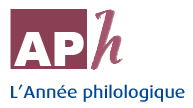Power and poetry: Augustus’s image in early Principate literature
DOI:
https://doi.org/10.11606/issn.2177-4218.v6i6p36-48Keywords:
Roman Principate, August, Literature, Power, RepresentationAbstract
Throughout his rule, the Emperor Augustus accumulated honors and powers that allowed him to control the Roman public life. The consulship, the almost religious aura arising from the Augustan rank, the total command of the armies, among others, helped increase his authority over the republican institutions. However, the legitimacy of the princeps’s might did not rely solely on the concentration of republican powers and titles. In fact, the sovereign also used a cultural system capable of assisting in the consolidation of his power and in building a positive consensus about his government. In this sense, he stimulated the literary production of his own times, bearing in mind that the works of Latin poets would be of great value in achieving that consensus. That said, the aim of this work is to analyze the ways in which Virgil, Horace, Propertius, Tibullus and Ovid depicted the imperial power in their versesDownloads
Download data is not yet available.
Downloads
Published
2015-12-14
Issue
Section
Articles
License
Responsibility for the content published by Mare Nostrum rests exclusively with the author(s) of such content.
The reproduction of the texts published by Mare Nostrum is licensed according to Creative Commons license Attribution-NonCommercial 4.0 International (CC BY-NC).
Authors who publish with this journal agree to the following terms:
- Authors retain copyright and grant the journal right of first publication with the work simultaneously licensed under a Creative Commons Attribution License that allows others to share the work with an acknowledgement of the work's authorship and initial publication in this journal.
- Authors are able to enter into separate, additional contractual arrangements for the non-exclusive distribution of the journal's published version of the work (e.g., post it to an institutional repository or publish it in a book), with an acknowledgement of its initial publication in this journal.
- Authors are permitted and encouraged to post their work online (e.g., in institutional repositories or on their website) prior to and during the submission process, as it can lead to productive exchanges, as well as earlier and greater citation of published work (See The Effect of Open Access).
How to Cite
Power and poetry: Augustus’s image in early Principate literature. (2015). Mare Nostrum, 6(6), 36-48. https://doi.org/10.11606/issn.2177-4218.v6i6p36-48









